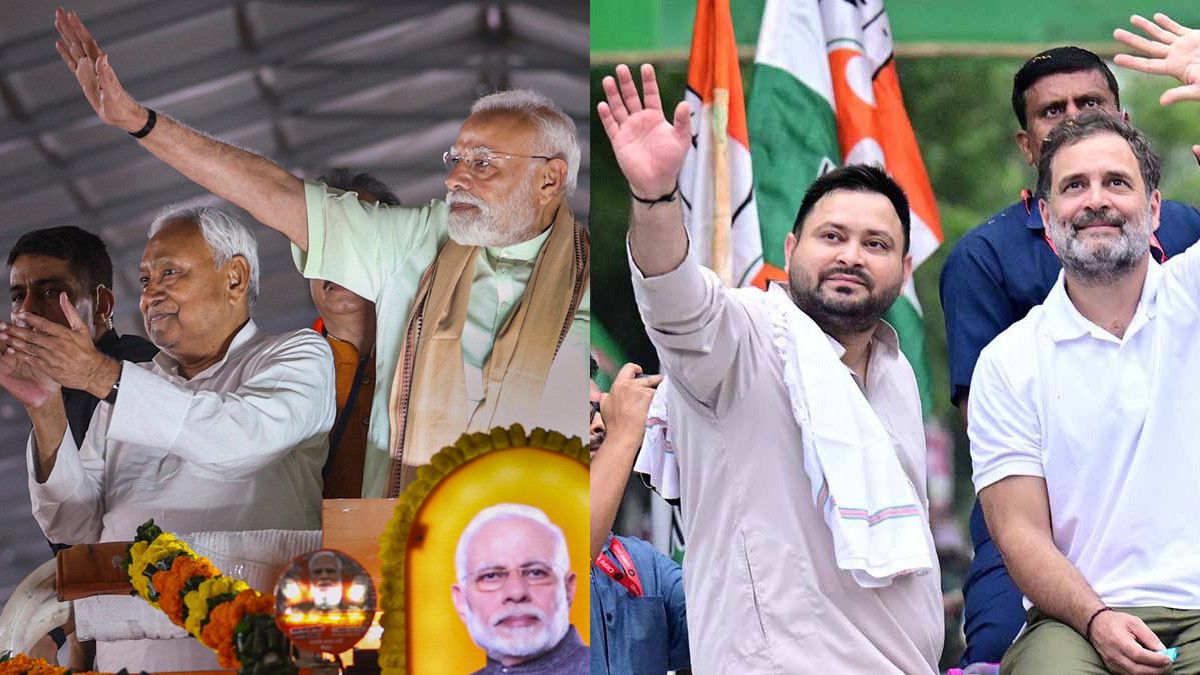Bihar assembly polls: Seat-sharing tensions mount in NDA and Mahagathbandhan, small parties rattle grand alliances

The two major political alliances in Bihar, the Mahagathbandhan and National Democratic Alliance (NDA), are facing mounting challenges over seat-sharing arrangements. The smaller partners in ruling camp, HAM and LJP (RV), and VIP in the Opposition camp, are holding their ground and pressing for a fatter share of seats, making it difficult for the main parties to arrive at a consensus. Despite the growing tension, both the BJP-led NDA and the RJD-Congress-led Mahagathbandhan claim they will sort out the matter soon.
Two months ago, Union Minister and Hindustani Awam Morcha (HAM) chief Jitan Ram Manjhi had told THE WEEK that it has been almost a decade since his party entered Bihar’s political scene, yet it still has not achieved the status of a recognized state party. “It will not be possible for us to accept fewer than 15 seats,” Manjhi had said. “Only then can we hope to win at least eight, which will qualify us for state party status.”
Since then, Manjhi has remained firm on his demand, creating a major roadblock in the NDA’s seat-sharing negotiations. With elections less than a month away, the delay is adding to the alliance’s anxiety.
Recently, Manjhi posted a cryptic message on X, “If there must be justice, then give half. And if even that faces some barrier, Then give just fifteen grams, Keep the rest of your vast land. We shall eat that little with joy, But never raise our hands against our kin.” The verse reflects Manjhi’s assertion of his demands in political bargaining.
Another ally complicating NDA’s math is the Lok Janshakti Party (Ram Vilas) led by Chirag Paswan. Paswan is demanding over 30 assembly seats, while the BJP has offered slightly above 20. According to political observers, Paswan is aware of his party’s loyal vote bank, which tends to remain steady. For he knows that if his party is not given proportionate importance, any move against the NDA can weaken their prospects of retaining the government.
In the previous assembly election, Paswan's party had polled around 6 per cent of total votes polled, significantly hurting the Janata Dal (United) in several constituencies. The BJP leadership, therefore, finds itself in a bind, keen to accommodate Paswan, yet unwilling to cede too many seats.
The Mahagathbandhan is not without its share of internal disputes. Although the Rashtriya Janata Dal, Congress, and Left parties have largely agreed on their respective quotas, Vikassheel Insaan Party (VIP) chief Mukesh Sahani has emerged as a sticking point. Expected to mobilize caste-based support of Mallah (Mallah community), Sahani is reportedly holding out for more seats than the 15 being offered to him. “He believes his community influence gives him leverage and is not ready to settle for less yet,” a senior RJD leader admitted.
For both alliances, the situation is sensitive. Larger parties already have candidates working on the ground, and if those seats are handed over to smaller allies, local resentment may trigger rebellion. Dissident leaders running as independents could spoil the prospects of winning in tightly contested constituencies.
At the same time, smaller parties see this as an opportunity to expand their footprint. Their relatively weaker grassroots network makes them eager to ride on the fame and resources of the bigger allies.
A political analyst observing the developments said, “It is crucial for both camps to iron out their differences now and approach the elections with unity. The alliance that manages to contain internal friction will have smoother coordination. For now, the NDA appears to be facing more pressure and pulls than the Mahagathbandhan.”
As Bihar moves closer to polling day, both alliances know that every seat, and every ally, will matter in what is seen to be a closely contested election.
India